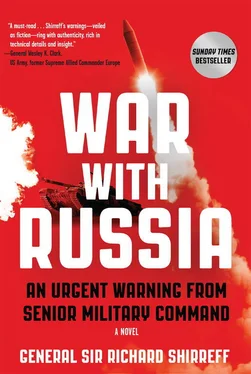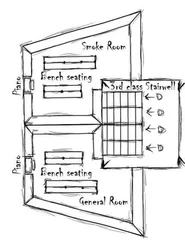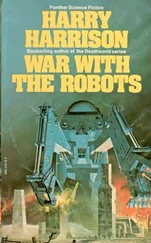Despite himself, Vronsky was impressed at the way he went from man to man, taking a keen and intelligent interest in the specialist equipment that no conventional Russian soldier would ever see, but with which each Spetsnaz soldier was equipped. The new generation helmets and body armor with chest and back plates made of titanium and hard carbide-boron ceramics, impervious to the NATO standard 5.56 millimeter ammunition with which the British would be equipped; the grenade launchers; the AS Val assault rifles, so suited to operating with stealth and giving a minimum signature with its heavy, subsonic 9 millimeter, high-performance, armor-piercing ammunition, and magnified day and image-intensifier night sights; plus the collar and helmet-mounted radios that allowed them to communicate hands free.
Eventually the inspection finished. Kirkorov turned to Vronsky, who braced up to attention once again.
“Major Vronsky, your soldiers are impressive. Now, I have one question.”
“Sir?”
“You are certain that these terrorists pose no threat to our Iskander missiles?”
“They are five men and a few Forest Brothers. What threat could they pose to your company of highly trained guards and my Spetsnaz? No, Sir. They are obviously conducting a reconnaissance. And that is the last mistake they will ever make. The President will be forever grateful you allowed me to capture and hand them to you.”
The general smiled, looked at his ADC and pointed. “You. Make a note of Major Vronsky’s confidence and assurance.” Then he looked hard at the line of Spetsnaz. “Make sure you succeed in this mission. The President is depending on you. Russia is depending on you.”
Vronsky saluted, now doubly impressed: Kirkorov knew exactly how to play dirty politics as well as crush dissidents. He should never have allowed himself to be maneuvered into a statement like that but, had he demurred, he had little doubt the ambush plan would have been canceled.
“Thank you, Sir. My men will not let you down… Now, Sir. May I have your leave to carry on, Sir. Please?”
“Do so. The Motherland will be watching you.” Kirkorov gave a perfunctory touch to the peak of his cap by way of returning Vronsky’s parade-ground salute and walked out of the hangar, followed by his ADC and the base commander.
“Arsehole,” muttered one of the men in a stage whisper, as soon as they were out of earshot.
“I heard that, Lev Davidovich,” said Vronsky without turning around, not least to stop his men seeing the grin of relief that was breaking across his face at seeing the back of the general, and the imminent prospect of finally settling his score with this British officer. However, in that moment of triumph, he realized that he had allowed his mission to become personal. “I’m getting as bad as the President,” he muttered to himself, before turning to face his men.
“Mount up,” he ordered and they clambered up into the Ural-4320 trucks, which were to take them to Pravdinsk.
Just over an hour later, Vronsky and his men dismounted by the perimeter of the Pravdinsk command bunker. This was close to where the radio sked had come from and, unless the British were playing some double bluff, this is where they were heading for. But even if they were, so what? All that mattered was that he had arrived here before them and this time he had the benefit of surprise. He and this British captain were going to meet again and soon.
He looked at the luminous dial of his treasured Rolex diver’s watch: five and a half hours to sunset. Plenty of time to set up the ambush.
1500 hours, Saturday, July 8, 2017
The President’s Office, The Kremlin, Moscow
FYODOR FYODOROVICH KOMAROV, the President’s Chief of Staff, could see that his boss was uncomfortable. Despite his lack of height, the President had a presence that had always commanded respect, if not fear. But, Komarov observed to himself, since the sinking of the Queen Elizabeth , things had not worked out as expected and people were saying in ever louder whispers that the President had lost that sureness of touch that had been the hallmark of his rise to absolute power in the Kremlin. Was the President losing that reputation for strength that had guaranteed his position up until now? He looked at the expressionless faces around the table and wondered which of them was, even now, imagining themselves in the President’s chair.
The President’s pale, bloodless face was now flushed with anger, the pale eyes protruded more than usual, and sweat glistened on the bald patch where the hair had receded. Instead of speaking with his usual cold menace when less than pleased, he had of late been prone to outbursts of anger, shouting at his personal staff for the smallest apparent misdemeanors.
He was shouting now. This time at General Mikhail Gareyev, Chief of the Russian General Staff, who sat at the conference table in the President’s austere office in the Kremlin.
“Now you listen to me, Mikhail Nikolayevich,” he raged. “Just over a month ago, you assured me that you would have the insurgency in the Baltic states under control! And now you tell me that you have lost freedom of movement, except when moving in force, on all but major roads because of the actions of these Forest Brother guerrillas! Was it for this that you thinned out the troops in Ukraine and the garrison in Kaliningrad? And what about detaining that British captain I ordered you to find? Still no sign of him? He’s making a monkey of me… and you for that matter. I won’t have it. Do you understand? If you can’t deliver him, I’ll find someone who can!”
Gareyev stayed silent. He knew better than to interrupt the tirade and Komarov assessed that, with the President in this mood, he would soon switch targets. He was right. The President next turned on the Director of the FSB, Merkulov.
“A month ago you assured me, Lavrentiy Pavlovich, that NATO was in disarray! And yet you now tell me that all your stations in NATO capitals report a renewed unity and sense of purpose and a determination to do whatever needs to be done to take the Baltic states from us! How do you explain that?”
As head of the FSB, the feared State Security and Counter-intelligence service and heir to the KGB in both reputation and practice, Merkulov, despite his mild, bespectacled appearance was deadly. Komarov saw him as the only man in Russia capable of frightening the President.
Quietly, almost nonchalantly, he murmured, “Vladimir Vladimirovich, you should recognize that it was the unfortunate sinking of the two mine countermeasures vessels and your decision to torpedo the Queen Elizabeth when it posed no threat to us in the western Baltic that united NATO. And, if we wanted to ensure that America stepped up to lead the Alliance, we couldn’t have done better than slaughter those American airmen and women at Lielvārde Air Base in Latvia. If we had left the Americans well alone, they would not be threatening us now. And NATO without the Americans is nothing. That simple. But we didn’t and they are. Which is the problem we are facing now. What else is there to say?”
There was silence around the table. However, nobody moved to reprimand or distance themselves from Merkulov and that told Komarov much of what he feared: it increasingly looked if he was inextricably linked to the wrong man.
The President visibly curbed his rage. As an ex-KGB operative and former head of the FSB himself, he knew the power Merkulov wielded and that he needed his support.
In an effort to regain the initiative for him, Komarov changed the subject. “Vladimir Vladimirovich, may I recommend that we ask for a report on NATO dispositions.”
The President looked at Gareyev. “Go ahead, please,” he grunted in an effort to appear magisterial.
Читать дальше












